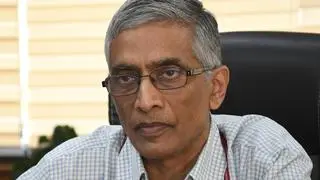Ahmedabad, Sep 1: India stares at a disastrous economic impact as the incidences of head and neck cancers with recurrence keep surging in the productive population in age group of 30-50 years. The impact could be prevented with a deep-rooted public education against chewing habits and sensitising people to opt for early diagnosis, concluded experts at a recently-held symposium on recurrent head and neck cancer at the HN Reliance Foundation Hospital, Mumbai.
In India, the head and neck cancer is found to be the biggest male cancer, found with one in every four male cancer patients. Among them, the mouth cancers surpass all others by far.
Speaking to Businessline on the issue, Dr Vijay Haribhakti, Director - Oncosciences at HN Reliance Foundation Hospital, said, "The economic impact of this disease is disastrous on our country. The incidences are rising and it is affecting the younger patients, those in prime of their earning years. It would be no exaggeration to say that the economic consequences would be disastrous for the country now and going forward."
"Today, the commonest age-group decades developing such cancers would be 3rd 4th and 5th," he said. The recent trends have shown that the head and neck cancers - mostly mouth cancers - are no longer just a cancer of elderly as it strike the young.
Late diagnosis is another concern. "Approximately 60-70 per cent of all cases, are detected in the stage 3-4 or are at an advanced stage. So, the recurrence is very common. When diagnosed late, the possibility of treatment failure increases exponentially. And recurrent disease is very difficult to cure."
The recurrence is a poignant problem in the country and is also related to socio-economic status and habits besides occupational effects.
Tobacco chewing
Certain occupations where laborious/manual operations are involved, prompts a person to develop a chewing habit, which eventually lead to develop cancers of mouth. Most of the mouth cancer patients related with tobacco addictions.
"There is a great need for awareness on this issue. If people have a habit of chewing anything of this kind, they should be made aware that they are at a significantly higher risk of getting a cancer."
Breast cancer
Commenting on the prevalence of cancers in India against the rest of the world, Dr Haribhakti stated that "In female, the commonest cancer in India is breast cancer, the same is true globally too. But in male, globally lung cancer tops followed by prostate cancer. But in India, by far the head and neck cancer leads followed by lung cancer. So, the relative differences are quite significant and the biggest reason is chewing habits in India," he said adding that the chewing habits are not going anywhere because there is not enough deterrent to it.
"India has a large number of preventable cancers but what can make a difference is the prevention. There needs a control on habits, with a very deep-rooted public education. Nothing short of that will make a dent on habits. Secondly, the early diagnosis," he said.








Comments
Comments have to be in English, and in full sentences. They cannot be abusive or personal. Please abide by our community guidelines for posting your comments.
We have migrated to a new commenting platform. If you are already a registered user of TheHindu Businessline and logged in, you may continue to engage with our articles. If you do not have an account please register and login to post comments. Users can access their older comments by logging into their accounts on Vuukle.